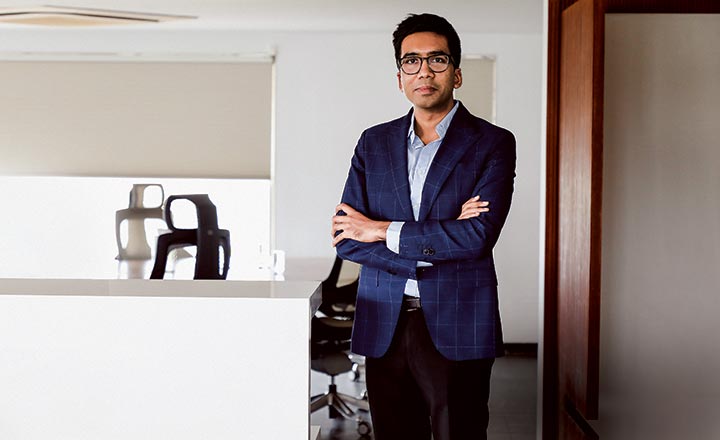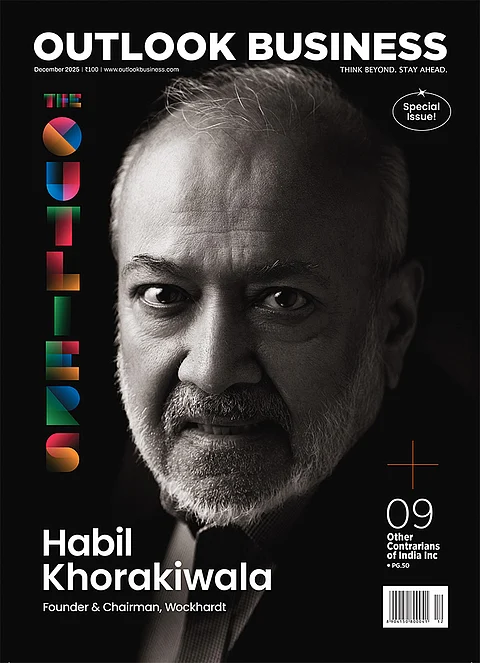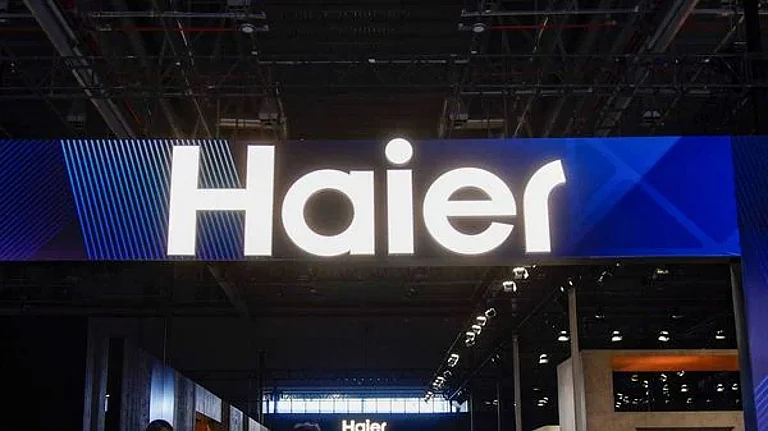Two years ago, drug companies were accused of “getting away with murder”. Perhaps, President Trump was overstating it. Theatrics is a politician’s forte. But, Indian companies soon began facing the heat in that market. Once their favourite hunting ground, the US market turned into a nightmare. There was price erosion, worsened by the consolidation of buyers and an increase in the number of suppliers. Biggies with high exposure — Sun Pharma or Lupin or Dr Reddy’s — are still grappling with the crisis.
Amid these turbulent times, there is one company, which has a business model in place, to tackle the headwind emanating from the US market — Ahmedabad-headquartered Torrent Pharma. In 2014, the company had decided to focus on domestic business and specialty products. This strategy has now paid rich dividends.
Speaking exclusively to Outlook Business at their plush office facing the Sabarmati river, Aman Mehta, chief strategy officer, says, “It was a conscious decision to continue with a greater focus on India, although we had a robust pipeline in the US market. How we looked at the US five years ago is very different from how we are looking at it now. It enabled us to allocate more resources to the branded markets.” His father and chairman of the company, Samir Mehta, has been instrumental along with his brother Sudhir Mehta in the strategy shift that Torrent Pharma undertook. Similarly, the brothers have steered the Torrent Group following the ‘diversify to minimise risk’ mantra.

Currently, the domestic market accounts for 42% of the company’s revenue, while the troubled US market contributes 21%. Torrent Pharma also has a strong presence in Brazil and Germany, which contribute 13% and 9%, respectively, to the revenue. With lesser dependence on the unfavourable US market, strong geographical diversification and fortifying of India business, Torrent has managed to grow at a decent pace over the past five years. Sales have grown at a CAGR of 13% to Rs.74.62 billion and Ebitda margin has expanded from 21.92% to 25.86% (See: High growth path).
Special focus
The pharma company did more than pick the right markets though. It went contrarian even with its products portfolio. While the rest of them were focused on selling cheap generics in the US market, Torrent went straight for specialty products — chronic and sub-chronic therapies in India, and branded generics. Chronic illnesses are ones that worsen over a period of time and sub-chronic are conditions that last for at least a month. “Chronic and sub-chronic therapies tend to have a longer prescription cycle,” says Mehta. Around 75% of the company’s revenue comes from this segment, whereas for the rest of the Indian pharma industry, it is 53% (See: Perfect dosage). Companies such as Sun Pharma and Lupin have also started focusing on chronic therapies since 2014, but still get a substantial part of revenue (40-45%) from generics in the US.

Torrent Pharma sells generics too, but focuses on branded ones in most geographies, except the US and Germany, says Siddhant Khandekar, research analyst at ICICI Direct. Unlike regular generics, branded pharma products are exclusively marketed by the developer. He adds, “Therefore, the company enjoys one of the best gross profit margin profile (70-72% range) among peers.” Around 90% of Torrent’s products are branded. With such offerings, there is higher brand recall within the medical fraternity.
The company also has more pricing power compared to its peers, as around 89% of its India portfolio is not listed under the National List of Essential Medicines (NLEM). “It means they can take 10% price hike each year on a large share of their product portfolio. This has been driving the Ebitda margin expansion and margins will increase going forward,” says Krishnanath Munde, pharma analyst at Reliance Securities.
Acquiring growth
The company has been careful with its in-house investments, and has alongside made prudent acquisitions. The pharma giant had already bagged the domestic branded businesses of Elder in 2014 for around Rs.20 billion and of Unichem Laboratories in 2017 for Rs.36 billion. These were funded through debt and internal accruals, says Mehta. While Elder marked the beginning of its India-focused strategy, the Unichem buy catapulted it among the top five drugmakers in the country.
“India has always been our primary focus market,” Mehta says, adding, “But the Elder portfolio did allow us to put a greater thrust on India.” With Elder, the company was looking to have a presence in the women healthcare space, where the Mumbai-headquartered company was an active player. It also helped Torrent be present in vitamins, minerals and nutrients (VMN). “If there is an opportunity to grow inorganically through acquisitions, we are looking at therapies where we are not quite strong,” says Mehta.
For Torrent Pharma, which predominantly focuses on drugs for specialty therapies in the Indian and Brazilian markets, Unichem was a perfect fit. “We have strengthened our cardio presence with the addition of Unichem brands,” says Mehta. “It was strong in cardio-vascular and within that, there is a sub-therapy called ARBs (angiotensin receptor blockers) for treating hypertension, where we were not very strong. That was a complementary fit for our portfolio,” he adds. Today, Torrent Pharma derives around 32% revenue from cardio space compared to 29% before FY17. The company’s overall revenue from Indian business also went up from 35% to 42%. Unichem’s domestic business derived around 60% of its revenue from the chronic segment, which also helped boost Torrent’s profitability. The company was able to get its hands on Unichem’s top brands such as Ampoxin (anti-infective), Losar (cardiovascular), Unienzyme (gastrointestinal), Telsar (anti-hypertension) and Vizylac (probiotic).
Brand building
While Torrent plugs gaps in its offerings by buying out others, it does not just sit idle. It has transformed the acquired products into big brands. Shelcal, a product earlier marketed by Elder, is a perfect example of that.
After the acquisition, Shelcal has evolved into a Rs.4.5 billion brand from the Rs.1.7 billion it was, five years ago. The company now has 19 brands among the top 500 in the Indian market with eight brands including Shelcal, Losar, Chymoral (pain relief) and Nexpro (gastrointestinal) topping more than Rs.1 billion in sales. The pharma major knew that Shelcal could go beyond women’s healthcare segment, and therefore came up with Shelcal XT in 2017. “We launched it with the intention to reduce the pill burden of customers,” says Mehta. Shelcal XT is now used for the treatment of calcium and vitamin D3 deficiency, osteoporosis, and post-menopausal osteoporosis. Traditionally, multinational players have ruled over this VMN space, but today, Indian players such as Torrent Pharma, Alkem and Mankind have a strong presence here with a market share of 4.23%, 4.37% and 6.14%, respectively.
One big reason why Torrent Pharma has been able to turnaround products and increase their reach at such a fast pace is the superior productivity of its field force of 3,700 employees. “Torrent Pharma leads the pharma industry in this aspect,” says Munde. It has 16 sales divisions with 3,200 stockists and 48,000 retailers. It also has 23 distribution centres across India. Post the Unichem acquisition, Torrent Pharma’s monthly field-force productivity dropped to Rs.440,000 per employee, as it incorporated the additional workforce. However, it is back to pre-acquisition level of Rs.750,000 in FY19. Through specialty-based promotion and portfolio prioritisation, the company has been able to maximise the potential of its workforce.
Mehta says field-force productivity is particularly important in branded businesses. “Their productivity is complementary to our specialty focus,” he says.” Analysts also believe that the integration of Unichem is successfully underway. “Historically, they have turned around acquired companies and the early signs with Unichem are good,” opines Param Desai, pharma analyst at Elara Capital.
De-risk business
In addition to the acquisitions in India that have helped Torrent Pharma to tide over the slump in the US business, the company’s decision to de-risk geographically has played a pivotal role in tackling headwind in an efficient manner. Similar to the strategy in India, it focuses on branded products (cardiovascular and central nervous system – CNS) in Brazil, which contributes around 13% to the business.
“Brazil’s pharma industry growth has been around mid-single digits, and we aim to grow above the market,” says Mehta. India and Brazil together make up 55% of the pharma company’s overall revenue.
According to analysts, the company has the first-mover advantage in this market. Torrent Pharma came here early, scouting for newer territories after the dissolution of the Soviet Union, which had been its biggest market. Even today, this is the biggest Indian firm in the country in terms of market share. “Brazil is a very competitive market since the entry barriers are very low. Therefore, it won’t be easy for any new entrant. Torrent has already registered its products and set up a strong network. Further, focus on branded generics augurs well,” says Desai.
Germany is a relatively smaller market for Torrent, but analysts expect decent 7-8% growth here. In this market, where it focuses on generic drugs, the company holds certain advantages — it has the approvals and distribution network is in place. Even with low margins, since Torrent Pharma has to undergo the tender process, (European governments procure medicines as out of pocket expenses is minimal), its low-cost manufacturing processes help it boost its profit. In fact, it is already the country’s largest Indian pharma player with 7% market share and the fourth largest generics company. Other biggies in the German generics market are STADA, Mylan, Sandoz International and Teva.
Temporary setback
While the company is well-positioned to grow in other geographies including India, it isn’t completely immune to regulatory and pricing problems in the US market. The company reported a loss of Rs.1.5 billion in the fourth quarter of FY19. This was from an impairment provision of Rs.2.17 billion on certain intangible assets of Bio-Pharm and the Losartan recall charges of Rs.1.4 billion. In December 2018, Torrent had recalled two lots of the hypertension medication after trace amounts of a carcinogen were detected in it. There was an additional recall announced in April this year. Mehta says, “This happened because of the outsourced API (raw material), which was used in manufacturing. We had to do a patient-level recall.” They had to discontinue the product immediately. But now, with a new API source, they are making a slow comeback.
There was another setback in April, which they are still working on. In January 2018, during what looked like the drugmaker’s expansion spree — it had bought out the US-based Bio-Pharm, which is known for its oral and over-the-counter medication. This was seen as Torrent’s deeper investment in building R&D and manufacturing capacity in the US. “Bio-Pharm acquisition was to diversify into the liquid US market,” says Mehta. But, USFDA raised concerns about the quality control at the facility and the company had to halt OTC liquid manufacturing operations. “We are currently upgrading the plant and have had to temporarily suspend manufacturing. This has been a challenging time but the plant should be operational again in six to nine months,” says Mehta.
Bright future
Venturing out into different geographies has not always been easy, but the pharma company still believes that it is on the right track. It has plans to increase its presence in Mexico and the UK markets, where it sees growth potential. “In Mexico, the pharma market has seen steady growth over a few years. As part of our strategy to expand our geographical base, we are looking at creating a presence there as well,” says Mehta.
Torrent is also working to deleverage its balance sheet that carries a debt of Rs.48 billion. “Most cash flows will go towards repayment of debt over two years,” says Mehta. The company’s net debt-to-Ebitda fell to 2.37x in FY19 from 3.11x in FY18. The management plans to bring it below 1x over the next two years, and also plans to continue investment in R&D segment. He states that the R&D spends should be in the average range of 8% of overall revenue (around Rs.3.5-4.0 billion), in line with industry trends.
Analysts agree that the US market is the only drag on Torrent’s performance. Munde says, “The base of sales from the US market was high because of Bio-Pharm buyout and new launches. They are now expecting weak growth. But the domestic business will outperform, and it will contribute majorly to profit.” Khandekar concurs, “India being a stable growth engine along with relative stability in Germany, the company is better placed to manage the volatility in other geographies.”
The American Dream may have turned unpleasant for most pharma companies, including Torrent, but this drugmaker has found its salve. It has its sights firmly trained on other geographies and branded products, and believe that they are on the right course.











